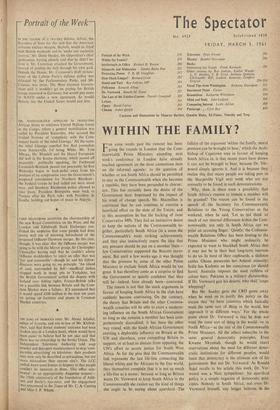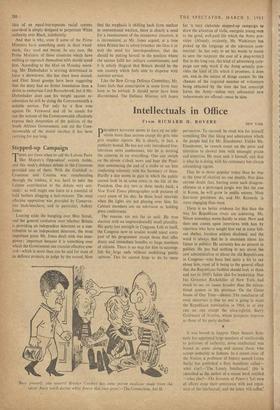WITHIN THE FAMILY?
FOR some weeks past the rumour has been going the rounds in London that the Com- monwealth Prime Ministers attending next week's conference in London have already reached agreement on the most contentious item on the informal agenda: to the question of whether or not South Africa should be permitted to stay in the CommonWealth when she becomes a republic, they have been persuaded to chorus: aye. This has certainly been the desire of the Government here. Impressed by the impact of his wind of change speech, Mr. Macmillan is convinced that he can continue to exercise a beneficial effect on the state of the Union; and in this assumption he has the backing of most Conservative MPs. They feel an instinctive desire to keep the nations of the Commonwealth to- gether, particulhrly South Africa (in a sense the Commonwealth's most striking achievement); and they also instinctively resent the idea that any pressure should be put on a member State— few Conservatives supported the Boycott move- ment. But until a few weeks ago it was thought that the pressure by some of the other Prime Ministers to exclude South Africa would be too great. It has therefore come as a surprise to find the Government so quietly confident that they will be—indeed, have already been—converted.
The reason is not that the stock arguments in favour of keeping South Africa in the club have suddenly become convincing. On the contrary, the theory that Britain and the other Common- wealth countries will be able to exert a moderat- ing influence on the South African Government so long as she remains a member has been com- prehensively discredited; it has been the other way round, with the South African Government exerting a deplorable influence on Britain at the UN and elsewhere, even compelling Britain to support, or at least to abstain from opposing, the UN's effort to secure justice for' South West Africa. As for the plea that the Commonwealth link represents the last life-line connecting the liberal whites and the Africans to the free world, they themselves complain that it is not so much a life-line as a noose: because so long as Britain wants Dr. Verwoerd to keep South Africa in the Commonwealth she cannot say the kind of things she ought to be saying about apartheid. The fallacy of the argument 'within the family, moral pressure can be brought to bear,' which the Arch- bishop of Capetown uses in favour of keeping South Africa in, is that recent years have shown it can not be brought to bear, because Dr. Ver- woerd simply ignores it. And it is because they realise this that many people are taking part in the Sharpeville Vigil next week who are not normally to be found in such demonstrations.
Why, then, is there even a possibility that South Africa's request to remain a member will be granted? The reason can be found in the speech of the Secretary for Commonwealth Relations to the Young Conservatives at the weekend, when he said, 'Let us not think so much of our internal differences within the Com- monwealth; not only in South Africa can we point an accusing finger.' Quietly; the Corbmon- wealth Relations Office has been hinting to the Prime Ministers who might ordinarily be expected to want to blackball South Africa that it may not be in their best long-term interests to do so. In most of their cupboards, a skeleton rattles. Ghana persecutes her Ashanti minority; India has Kashrdir on her conscience (or should have); Australia imposes the most ruthless of colour bars; Pakistan is a military dictatorship. If Dr. Verwoerd gets his deserts, who shall 'scape whipping?
But Mr. Sandys gave the CRO game away when he went on to justify this policy on the excuse that 'we have countries which basically want the same sort of thing in the world, but approach it in different ways.' For the whole point about Dr. Verwoerd is that he does not want the same sort of thing in the world—or in South Africa—as the rest of the Commonwealth Prime Ministers. All the others subscribe to the same" general democratic principles. Even Kwame Nkrumah, though he would insert reservations about the need for different demo- cratic institutions for different peoples, would insist that democracy is the ultimate aim of his government. But not Dr. Verwoerd: As Ronald Segal recalls in his article this week, Dr. Ver- woerd was a Nazi sympathiser; his apartheid policy is a simple negation of democratic prin- ciples. Nobody in South Africa, not even Dr. Verwoerd himself, any longer believes in the idea of an equal-but-separate racial system; apartheid is simply designed to perpetuate White authority over Black, indefinitely.
And that is why, even if some of the Prime Ministers have something nasty in their wood- sheds, they need not waver. In any case, the Prime Ministers of those countries which have nothing to reproach themselves with should stand firm. According to the Mail on Monday morn- ing, Mr. Diefenbaker is arriving determined to force a showdown; this has since been denied, and Fleet Street gossips have been suggesting that the story had no firmer foundation than a desire to embarrass Lord Beaverbrook. but if Mr. Diefenbaker does cast his weight against re- admission he will be doing the Commonwealth a notable service. For only by a firm vote against Dr. Verwoerd and all he stands for can the nations of the Commonwealth effectively express their detestation of the policies of the South African Government, and rid the Com- monwealth of the moral incubus it has been carrying for too long.







































 Previous page
Previous page